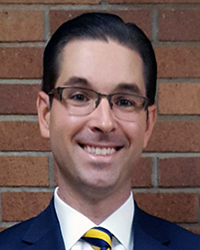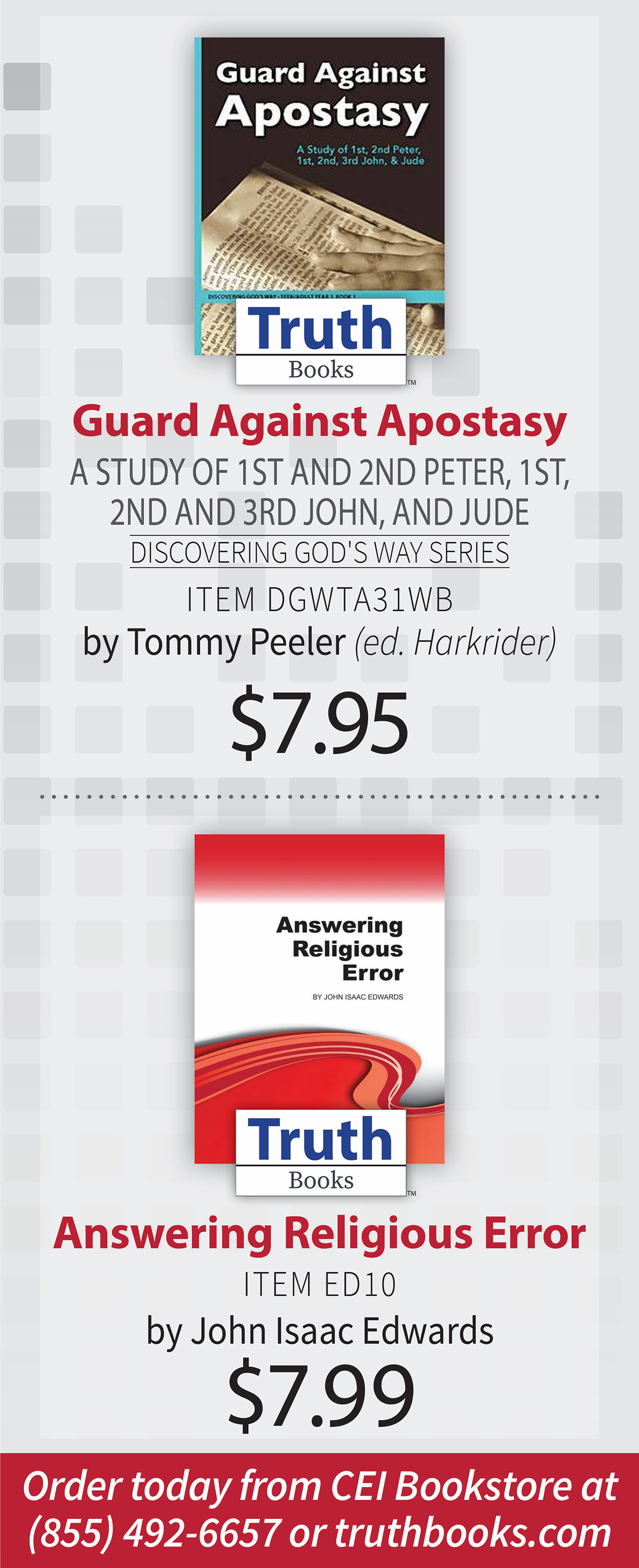

by David Flatt
Synopsis: Jesus' warning, "Beware of false prophets," addresses an ever-present danger that must not be minimized or misapplied.
Beware of false prophets, which come to you in sheep's clothing, but inwardly they are ravening wolves. Ye shall know them by their fruits. Do men gather grapes of thorns, or figs of thistles? Even so every good tree bringeth forth good fruit; but a corrupt tree bringeth forth evil fruit. A good tree cannot bring forth evil fruit, neither can a corrupt tree bring forth good fruit. Every tree that bringeth not forth good fruit is hewn down, and cast into the fire. Wherefore by their fruits ye shall know them (Matt. 7:15-20).
As Jesus begins to conclude His sermon, He identifies two paths in life we can choose to travel. There is a broad path which leads to destruction and a narrow path which leads to eternal life. While the choices are simple, making the correct choice can sometimes be challenging. One contributing difficulty to finding the narrow path of life is false prophets.
False prophets direct people to walk the broad path. The deception they use is quite persuasive and comforting to the masses. In the days of Jeremiah, false prophets encouraged Israel that everything was well with their relationship with God. Regarding their deception, God said, "They have healed the wound of my people lightly, saying, 'Peace, peace,' when there is no peace" (Jer. 6:14). In the days of Ezekiel, some prophets spoke according to the corrupt desires of their hearts (Ezek. 13). They soothed the people in their idolatry, injustice, and immorality—acting out of selfishness rather than a love for Jehovah. The path they were taking was leading them toward destruction.
In the New Testament, Jesus and saints alike were concerned about false prophets and false teachers. Jesus warned about imposter Messiahs and false prophets deceiving Israel from seeking safety when the Romans would besiege Jerusalem (Matt. 24:4-11). Peter and Jude profiled false teachers in their epistles (2 Pet. 2; Jude). Their letters indicate false prophets (in the worst-case scenario) promote heresy, are motivated by money, are sexually immoral, and do not respect authority. I do not believe that one must be able to prove that an individual has a false character to identify their teaching as false. Like Saul of Tarsus, many may be sincere but mistaken. Yet, frequently, there is more amiss than a misunderstanding of Sacred Scripture. With this biblical context in mind, consider the features of false prophets.
First, Jesus presents this information as a warning: "Beware of false prophets." Let us take this warning seriously. We do ourselves no favors by pretending false prophets/teachers do not exist. As far as Jesus was concerned, they were a real and present danger. This remains true today. Everyone trying to find and stay on the narrow path of life needs to beware of this specific danger.
Second, Jesus describes the motivations false prophets by comparing them to wolves. This fearsome animal is predatory. Wolves are vicious and kill for sport. Likewise, false prophets are harmful and selfish. They are not interested in the well-being of others. False prophets seek to exploit the weak and vulnerable for their selfish purposes.
Third, Jesus indicates the deceptive nature of false prophets: they are wolves in sheep's clothing. Sensible folk avoid wolves because they are wild and dangerous animals. Such prudence is made difficult due to stealth, disguises, and deception. False teachers disguise their real character, presenting themselves as honest, loving people. Through their winsome personalities, they can gain influence. Christians are supposed to be welcoming individuals who give strangers the benefit of the doubt. Such otherwise commendable traits can make protecting ourselves from false prophets challenging.
Fourth, Jesus tells us how we can identify a false prophet: "By their fruits, you will know them." In other words, "Pay attention." If we are going to be as wise as serpents and as harmless as doves, we must ask questions as we make a careful observation about people. What fruit is a person is producing in his or her life? What is the state of their relationships? Does their every relationship end badly? What is the condition of his family life? Have they been to every church in town? What are their history and reputation?
How can we find answers to these types of questions? Indeed, not by interrogation. Instead, such answers can be learned by getting to know a person. Some folks will not let others get to know them. Why? False prophets have things about themselves they want to hide. They may seek to paint a false picture or present a false history. However, the more we learn about a person's life, the better we understand the kind of fruit they have borne.
What are some of the things a false prophet might say to deceive people into choosing the broad path? There are two general approaches identified by Jude and Peter.
First, false prophets promote error regarding God's grace. Jude warned about people turning God's grace into lasciviousness (Jude 4). Peter warned of false prophets living according to lust and uncleanness (2 Pet. 2:10). What does this mean? Some affirm that God's grace will cover unrestrained, immoral behavior. We may sometimes struggle to understand how God expects us to live moral and ethical lives in light of His saving grace; however, God's grace most certainly does not permit us to sin (Rom. 6:1). Instead, His grace teaches us to deny ungodliness and worldly lusts and to live self-controlled, upright, and godly lives (Titus 2:14).
Yes, the broad path leading to destruction is filled with people who think they are saved simply because Jesus died on the cross for the sins of mankind. Calvinism, the theological foundation of many false religions, promotes this erroneous concept. This false doctrine keeps people from recognizing the demands of saving faith, namely, obedience. False teachers deceived people into believing that God's grace allows them to live in sin.
If we learn anything from Jesus' sermon, we understand that morals and ethics matter in His kingdom (Matt. 5:21-48). Worldliness has no place in God's kingdom. While none will ever attain perfection, we daily aspire to live more like the One who died for us (2 Cor. 5:14-15). This will never happen so long as we view God's grace as providing permission to sin.
Second, false prophets will deny God and His Son, Jesus our Lord (Jude 4; 2 Pet. 2:1). They reject the authority of the Creator. Rather than seeking to glorify God, they try to push Him out of their lives and exalt themselves (Rom. 1:18-25). False prophets are an authority unto themselves. Who the Creator is and what He has said is of no consequence to the selfish agenda of false prophets.
Jude and Peter warn about false prophets denying the Lord, Jesus Christ. While this would include rejecting the authority of Jesus and His teaching, it may also involve rejecting the uniqueness of Jesus. Our Lord was not like other humans. Yes, He was flesh and blood; however, He was different from (and superior to) everything earthly and human.
On one occasion, Jesus declared, "You are from below; I am from above. You are of this world; I am not of this world. I told you that you would die in your sins, for unless you believe that I am he you will die in your sins" (John 8:23-24). Believing that Jesus came from God was always the sticking point for the Jews. When He claimed to be God by saying, "Before Abraham was, I AM," the Jews tried to kill Him (John 8:58-59). Near the end of His life, Jesus said, "I am the way, and the truth, and the life. No one comes to the Father except through me" (John 14:6).
Ultimately, God validated Jesus' uniqueness by raising Him from the dead. Nonetheless, even after the resurrection of Jesus, people in the first century continued to reject His divinity. Addressing this problem, the apostle John wrote,
Beloved, believe not every spirit, but try the spirits whether they are of God: because many false prophets are gone out into the world. Hereby know ye the Spirit of God: Every spirit that confesseth that Jesus Christ is come in the flesh is of God: And every spirit that confesseth not that Jesus Christ is come in the flesh is not of God: and this is that spirit of antichrist, whereof ye have heard that it should come; and even now already is it in the world (1 John 4:1-3).
False prophets often do not acknowledge the uniqueness of Jesus. They do not believe that Jesus was God in the flesh. They do not teach Jesus as being the only way to heaven. Of course, a pluralistic approach to spirituality is quite appealing in our culture. The broad path of destruction is filled with people who believe Jesus is one of many ways to heaven. They put Jesus on the same level as other famous teachers of morality and ethics. We must beware of this deceptive characteristic of humanism.
We need to be alert. As Jesus affirmed, we must beware of the real and present danger of false prophets today. Viewing false prophets as merely a problem of the past will only increase our vulnerability to their present peril.
We need to get to know people. The more we foster relationships, the more we perceive the fruits of each other's lives. If, over the process of time, there are beliefs, practices, and or teachings which are concerning, we need to study. If someone is unwilling to study, that should be enough to reveal motivations. However, as John instructed, we must test and try the spirits whether they are of God. If the beliefs, practices, and teachings of someone cannot be supported with the Bible and he is unwilling to change, their beliefs, practices, and teachings need to be exposed by the light of truth. People must be warned about specific false prophets.
As seriously as we take Jesus' warning about false prophets, we should also approach this subject with a sense of balance. Pride can hurt the cause of the kingdom when dealing with false prophets. There seems to be an air of suspicion Christians have toward one another. When we view each other as threats simply because we are unfamiliar with one another, we harm the cultivation of love and unity in God's kingdom.
In his work on the Sermon on the Mount, Paul Earnhart wrote, "The fear of pseudo-disciples has moved some Christians to paranoia. They sense false teachers behind every bush and are constantly in a questioning and investigative mood. But there is nothing in Jesus' words to make His disciples constitutionally suspicious, even cynical, toward all their brethren" (143-144).
The advent of the internet and social media provides new platforms for thoughtlessly spreading suspicion and paranoia. Ironically, brethren will often lament the media's approach to journalism and dissemination of facts; yet, engage in the same kind of disingenuous, "Gotcha journalism" in their approaches to labeling one another as false teachers. Additionally, some readily take the word of one they trust over the actual words of the one who is being labeled a false prophet. We can learn a lot about each other by trying to build genuine relationships based on love rather than through interrogation. When Apollos was teaching an incomplete message, Priscilla and Aquila privately studied the Scriptures with him. Their first reaction was not to publicly discredit him, but to lovingly teach him the gospel (Acts 18:24-28).
False prophets are a real and present danger with which we must contend (Jude 3-4). However, before we arrive at the point where we must label and warn others about a specific individual, we must have the facts. If we disagree with a doctrine being advocated, we had better be able to answer publicly and without reservation why that doctrine is wrong.
If we are not methodical in our approach and motivated by love in dealing with this danger, we will become guilty of division in God's kingdom. Paul identified specific false teachers by name in some of his letters (i.e., 1 Tim. 1:19-20; 2 Tim. 1:15; Phil. 3:2). This establishes a scriptural precedent for identifying false teachers. At the same time, do not forget Paul that constantly had brethren labeling him as a false apostle (2 Cor. 3; Phil. 1:15-16). All he had to rely on to aid him through such malicious attacks was his selfless reputation. Paul was motivated by self-sacrificial love (2 Cor. 10-12).
In summary, false prophets certainly make choosing the right path in life difficult. They have effectively deceived many into choosing the broad path, which only leads to destruction. Only by manifesting a genuine love for Christ and a willingness to bring our lives into harmony with the truth can we find the narrow path. Remember, Jesus promised to provide for all who ask, seek, and knock (Matt. 7:8). Nevertheless, we must also be careful in how we engage the threat of false prophets. The devil wants nothing more than for Christians to spread suspicion, paranoia, and division in the kingdom. May love protect and guide us in the work of the furthering His kingdom.
Earnhart, Paul.Invitation to a Spiritual Revolution—Studies in the Sermon on the Mount. Tampa, FL: Deward Publishing Company, 2009.
Author Bio: David and his family have labored with the Thayer Street congregation in Akron, Ohio since 2008. The church website is thayerstreetcoc.org. He can be reached at dflatt85@yahoo.com.

